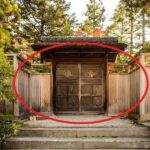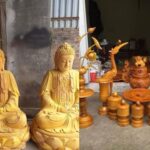The ancestral altar is a sacred space and is considered the spiritual center of every family. It is a place for descendants to worship their ancestors and connect with blessings and fortune.
If you’ve been struggling financially despite your hard work, it’s time to inspect your ancestral altar to avoid making the following mistakes.

Struggling Financially Despite Your Hard Work? Check Your Ancestral Altar for These Major Don’ts
1. Ancestral Altar Facing the Wrong Direction
Facing a Hung Sha Direction
When the ancestral altar is placed in a direction that clashes with the homeowner’s lifepath number or faces a hung sha (negative energy) direction, it can lead to financial losses and family disharmony. For example, if the homeowner’s lifepath number is East Four Trigram and the altar faces the West Four Trigram direction, it is a major taboo.
How to Rectify
- Adjust the direction of the ancestral altar according to Feng Shui principles, taking into account the homeowner’s lifepath number.
- If changing the direction is not feasible, use a Bagua mirror or other Feng Shui cures to mitigate the negative impact.
2. Incomplete or Cluttered Altar Offerings
Major Taboo: Missing Important Ritual Objects
An ancestral altar missing essential ritual objects such as the incense burner, worship lamp, or flower vase is a sign of disrespect to the ancestors. This can hinder the flow of blessings and good fortune into the home.
Cluttered Altar Arrangements
An altar with too many offerings, arranged haphazardly, can disrupt the balance of energy and block the family’s luck.
How to Rectify
- Arrange the ritual objects according to the rule: Incense burner in the center, flanked by flower vases and candleholders. Always use an odd number of offerings (3, 5, or 7).
- Keep the altar clean and tidy, regularly replacing old offerings with new ones to demonstrate sincerity.
3. Ancestral Altar Near a Bathroom or in a Dark Corner
Taboo: Disrespectful Placement
Placing the ancestral altar near a bathroom, facing the kitchen, or in a dark corner is a major Feng Shui taboo. These locations lack the requisite solemnity and can dissipate positive energy, leading to financial losses.
How to Rectify
- Relocate the ancestral altar to a higher, well-ventilated area, away from bathrooms and kitchens, which emit inauspicious qi.
- If relocation is not possible, use curtains or dividers to shield the altar from negative influences.
4. Using Damaged or Mismatched Ritual Objects
Damaged Objects Interrupt the Flow of Blessings
Broken or damaged ritual objects like incense burners, worship lamps, or incense holders can disrupt the flow of blessings within the home.

Incorrect Placement of Worship Photo Can Lead to Dwindling Fortune
Mismatched Objects Lack Solemnity
Using ritual objects that are mismatched in style and color can make the ancestral altar appear less solemn, negatively impacting the family’s luck.
How to Rectify
- Replace any damaged ritual objects with new, high-quality ones.
- Use a matching set of ritual objects to maintain solemnity and harmony.
5. Neglecting to Burn Incense or Offer Rituals Regularly
Neglect Leads to Diminished Blessings
Failing to burn incense or perform rituals on important days such as the full moon, new moon, or during festive holidays is a sign of disrespect to the ancestors, leading to financial losses.
How to Rectify
- Maintain the daily practice of burning incense or perform rituals on special occasions.
- Prepare simple but sincere offerings to demonstrate respect to your ancestors.
6. Ancestral Altar Placed Too High or Too Low
Inconvenient and Disrespectful Placement
An ancestral altar placed too high can make worship inconvenient, while one placed too low lacks solemnity.
How to Rectify
- Position the ancestral altar at a comfortable height, typically between 1.5m and 1.8m, to facilitate convenient incense burning.
The ancestral altar is a sacred space that influences the family’s luck and fortune. If you’ve been facing financial struggles, inspect your altar for these major taboos. By making the necessary adjustments and caring for your ancestral altar properly, you will invite blessings, good fortune, and prosperity into your home, overcoming difficulties and embracing a brighter future.





































